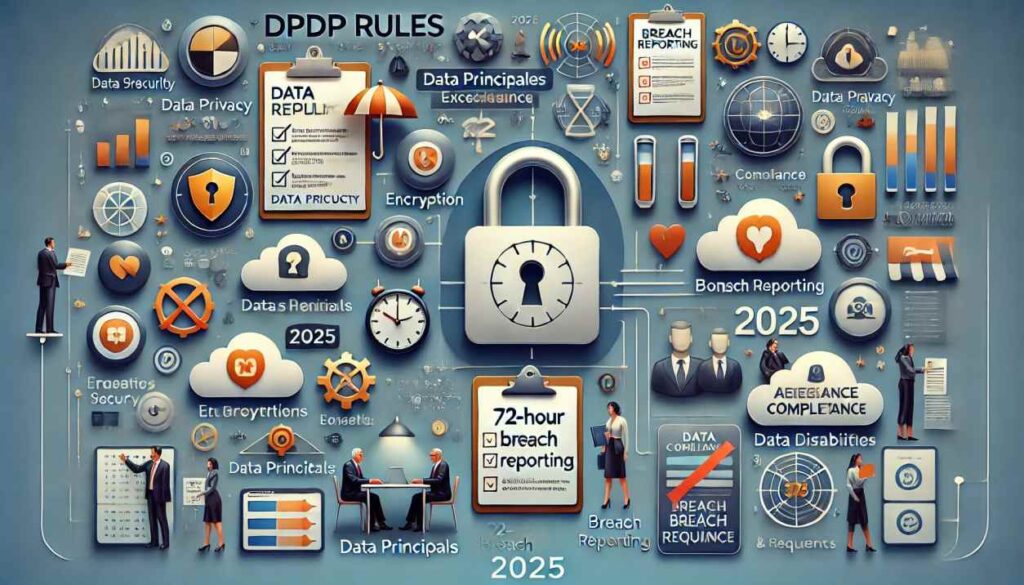
Overview of the DPDP Rules, 2025
The Digital Personal Data Protection (DPDP) Rules, 2025, introduced under the Digital Personal Data Protection Act (DPDPA), 2023, mark a transformative step in India’s data privacy landscape. By emphasizing transparency, accountability, and security, these rules aim to balance individual rights with organizational compliance requirements.
Empowering Data Principals
The DPDP Rules empower individuals—referred to as data principals—to maintain control over their personal data. Key rights include:
1. Access, Correction, and Erasure: Individuals can access, request corrections, and erase their personal data as required.
2. Consent Withdrawal and Grievance Redressal: Mechanisms for withdrawing consent and addressing complaints ensure accountability and accessibility.
3. Timely Data Breach Notifications: Data fiduciaries must notify breaches within 72 hours and provide detailed reports to the Data Protection Board, fostering trust.
Privacy and Data Protection as Cornerstones
Data protection forms the foundation of the DPDP Rules, with mandates to ensure stringent safeguards for sensitive personal information:
- Encryption and Access Controls: Encryption, virtual tokens, and robust identity verification processes protect sensitive data.
- Safeguarding Vulnerable Groups: Special provisions for children’s data include obtaining verifiable parental consent to process their personal information.
- Privacy Policies: Fiduciaries must adopt clear and well-crafted privacy policies to inform individuals about data processing and protection mechanisms.
Operational Guidelines for Data Fiduciaries
Data fiduciaries are tasked with implementing robust data management practices:
- Notices and Consent: Provide transparent notices and enable seamless mechanisms for data principals to exercise their rights.
- Significant Data Fiduciaries: Organizations meeting certain thresholds must adhere to additional responsibilities, including:
- Data Protection Impact Assessments (DPIAs): To identify and mitigate risks in processing sensitive data.
- Annual Compliance Audits: Ensuring ongoing adherence to privacy obligations.
- Algorithmic Fairness Compliance: Addressing biases in automated processing.
- Cross-Border Data Transfers: Implementing secure protocols for international data flows.
Addressing Ambiguities
Despite its robust framework, certain challenges persist:
1. Undefined Exemptions for Startups: Undefined thresholds for exemptions pose operational challenges for small businesses.
2. Retrospective Consent Obligations: The lack of clarity on prior consent validity raises questions for organizations managing historical data.
Key Implementation Steps for Organizations
To ensure compliance with the DPDP Rules, organizations should focus on:
1. Data Discovery and Mapping: Identifying personal data touchpoints and documenting data flows across systems, processes, and third parties.
2. Consent and Notice Management: Updating privacy notices, cookie policies, and consent mechanisms across data collection points.
3. Privacy Impact Assessments: Identifying risks in processing activities and implementing mitigation controls.
4. Third-Party Risk Management: Ensuring third parties handling data comply with security measures through strong contractual governance.
5. Technical Safeguards: Implementing encryption, breach reporting systems, and identity verification tools to protect personal data.
6. Data Protection Office: Establishing a dedicated team to ensure compliance, monitor practices, and drive automation for efficiency.
Monitoring and Sustenance
Organizations are encouraged to implement a periodic compliance monitoring program to assess adherence at regular intervals and sustain long-term data privacy practices.
The Road Ahead for Data Privacy in India
The DPDP Rules, 2025, present significant progress in establishing a structured and secure data governance framework. However, stakeholders, particularly startups, face challenges in navigating ambiguous exemptions and retrospective consent obligations. As India transitions towards a data-driven economy, organizations must prioritize compliance to build trust and align with global standards.
Disclaimer: This article highlights key aspects of the DPDP Rules, 2025, and does not constitute legal advice. Organizations should consult privacy experts for detailed compliance guidance.
For more details and structured learning, please explore our Operational Risk Management Course.


